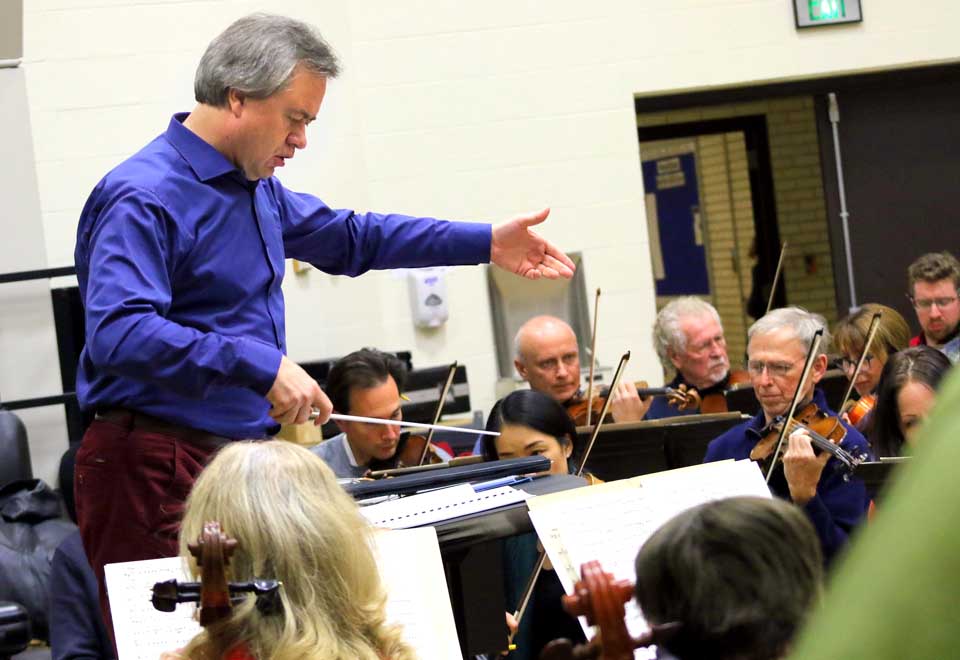3RD CONTESTANT FROM POLAND
CSO Prospect To Focus
On Tchaikovsky Works

Editor’s Note: Maciej Żółtowski, the third candidate to become the Catskill Symphony Orchestra’s next conductor, will perform at 7:30 p.m. this Saturday, Nov. 16, at SUNY Oneonta’s Hunt Union Ballroom. Tickets at door or via https://catskillsymphony.net/ This article appears in this week’s Hometown Oneonta and The Freeman’s Journal, on newsstands now.
By LIBBY CUDMORE • Special to www.AllOTSEGO.com
ONEONTA – For Maciej Żółtowski, conducting is a kind of enchantment.
“It is similar to magic,” he said. “You get up there, you wave your stick and music comes out!”
Appropriate, then, that Żółtowski, the former managing and artistic director of the Radom Chamber Orchestra in Poland, will be conducting Stanisław Moniuszko’s “Concert Overture: The Fairy Tale,” as part of the third and final entry in the Catskill Symphony Orchestra’s Conductor Search concert on Saturday, Nov. 16.
The piece, he said, is close to his heart.
“When I was six, my grandfather took me to the National Opera House in Warsaw for a performance of Moniuszko’s ‘The Haunted Manor,’” he said. “It was my first encounter with live music,” he said. “I was enchanted by the theater, but also the sounds of the orchestra coming from the pit. Where was this sound coming from that sounded so beautiful?”
He played the recorder in an elementary school orchestra, then went to a secondary music school, where he played violin. There, he served as the choir conductor at the conservatory. “He offered to give me lessons and made me his assistant,” he said. “That was my first public appearance as a conductor.”
He continued his studies at the prestigious F. Chopin and J. Elsner music schools in Warsaw, and, while conducting on a Hungarian TV competition, he caught the eye of judge Yuri Simonov, who invited him to attend master classes.
“He taught me that conducting was about how you worked, not how you looked on the podium,” he said. “What mattered was how the conductor could transform sound and inspire the orchestra.”
He learned about the Catskill Symphony Orchestra from Doris Yarick-Cross, head of Yale’s voice and opera program, who he collaborated with at the Radom Chamber Orchestra. “I was visiting her, and her husband Richard (an opera singer and member of the Yale music faculty) told me about Chuck Schneider’s retirement – he had been Richard’s accompanist!”
He chose three pieces from the romantic period, including two pieces by Tchaikovsky; “Piano Concerto No. 1 in B-flat major, Op. 23” with soloist Alex McDonald, piano, and “Symphony No. 5 in E minor, Op. 64.”
“The piano concerto is a real blockbuster,” he said. “Especially that opening bar.”
The second Tchaikovsky piece inspired him by how “highly emotional” it is. “I wanted to put together a concert with emotional diversity,” he said. “You can see the composer struggling with writer’s block in the beginning,” he said. “They’re dark times for the composer. But in the last bars, it becomes a march, and it’s so amazing how you can transform your feelings into the exact opposite.”
If selected as the music director, Żółtowski hopes to make people more appreciative of classical music. “People are aware that it exists, but they think it’s a specimen of the past,” he said. “Most people think that music is just for entertainment, and they usually just mean pop music.”
He wants to host a series of educational concerts for adults as well as children, such as opening up rehearsals complete with audio guides that explain the story as it’s happening on stage.
And a few lucky people might actually get to sit on stage with the musicians. “Someone told me that when he sat up there, he felt an electric current between the musicians,” he said. “You experience music completely differently.”
He would also like to bring music to those who might need it most. “The symphony could do concerts in hospitals, or work with the college psychology departments to do music therapy,” he said.
But not matter who hears the music, he believes everyone can enjoy it. “Tchaikovsky believed that every being is a container for all of human history, that they have many layers of culture and knowledge” he said. “And he believed that because of that, anyone can experience music, because it will find a layer to speak to their soul.”
“The conductor’s job,” he continued. “Is to remove those layers.”

